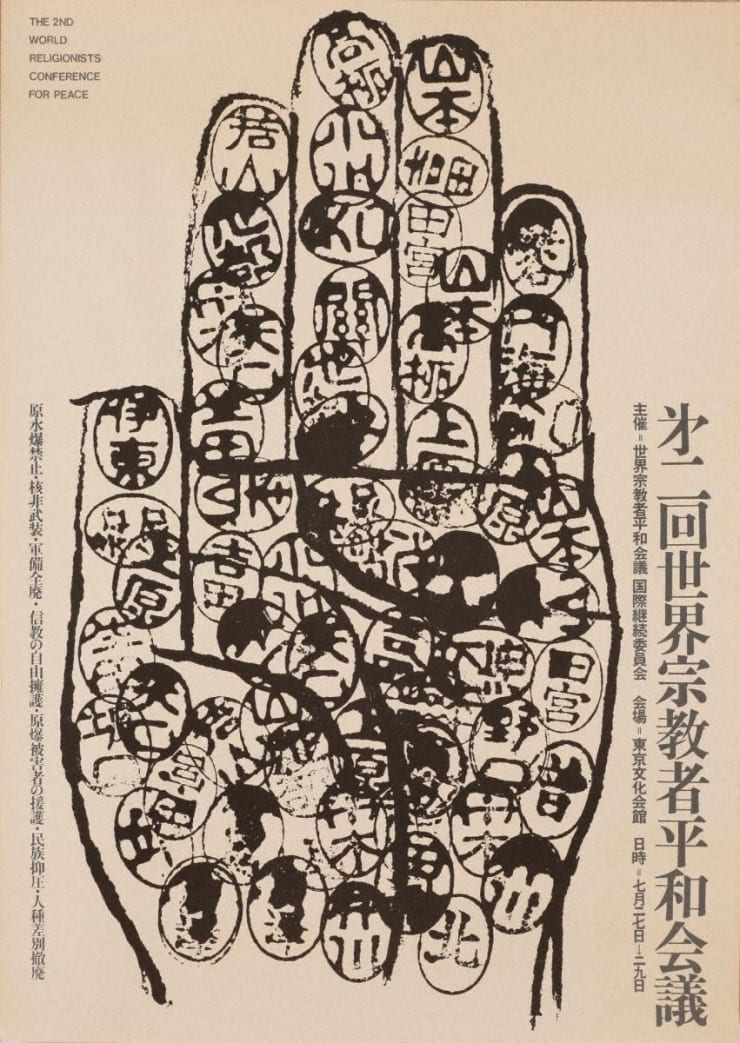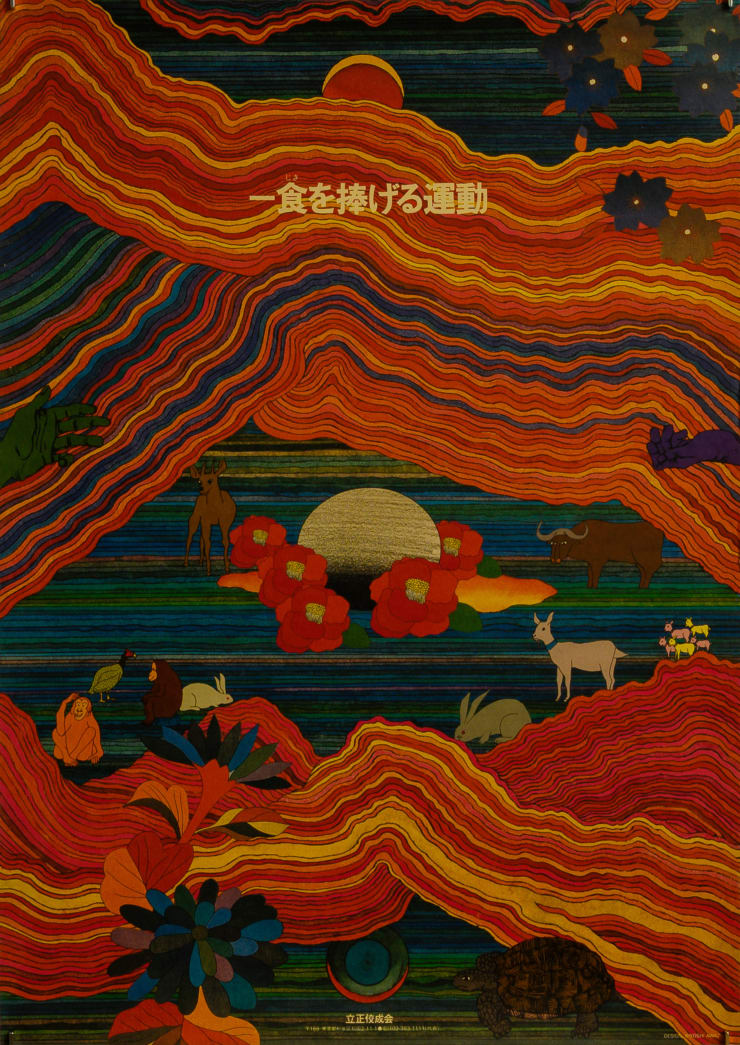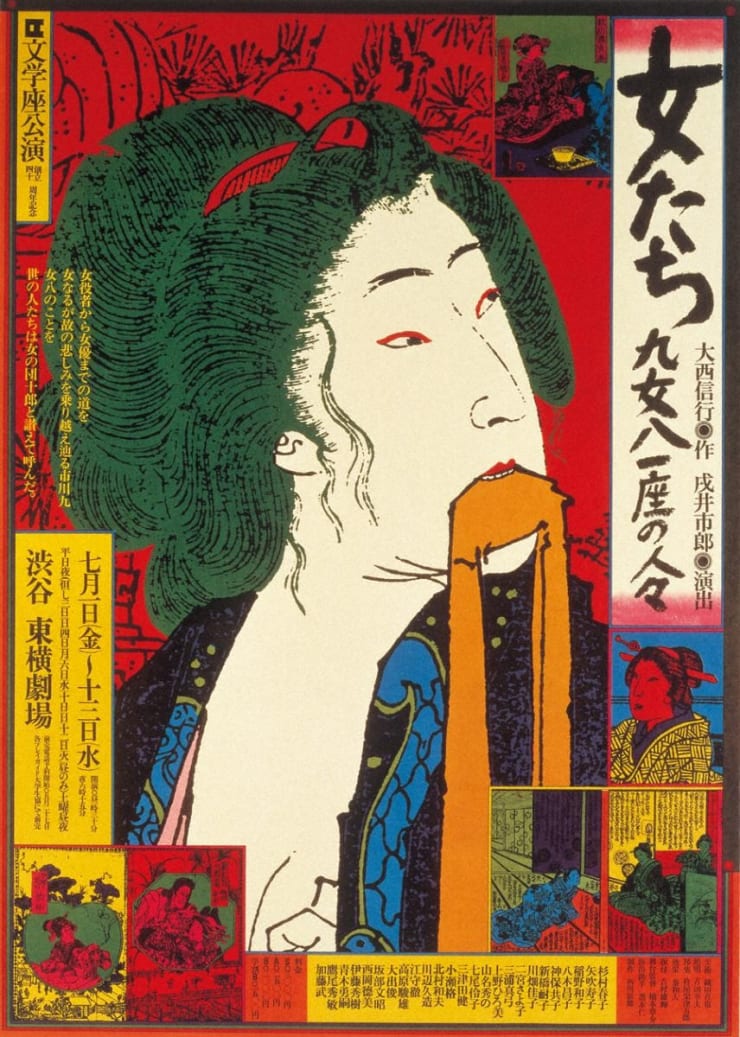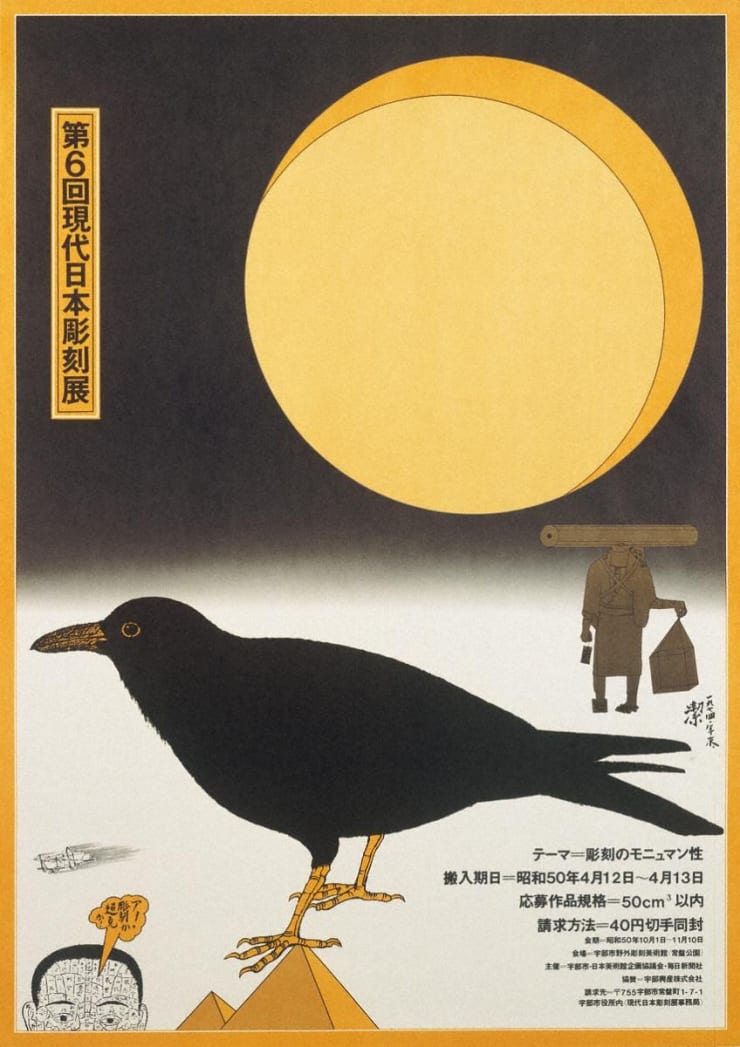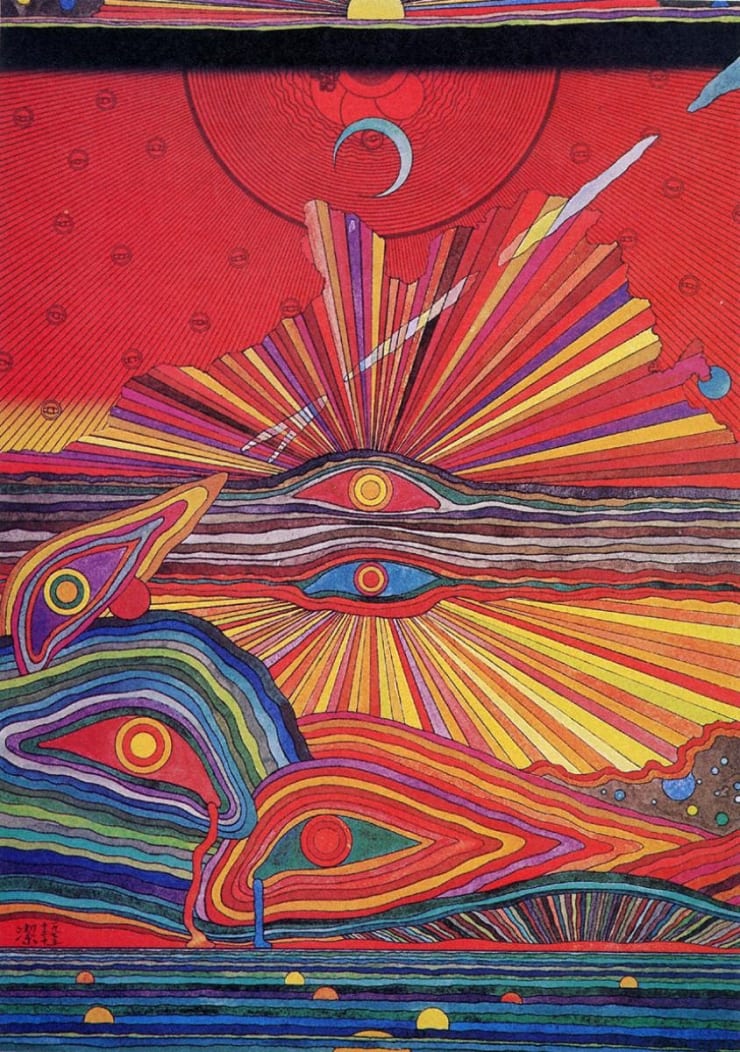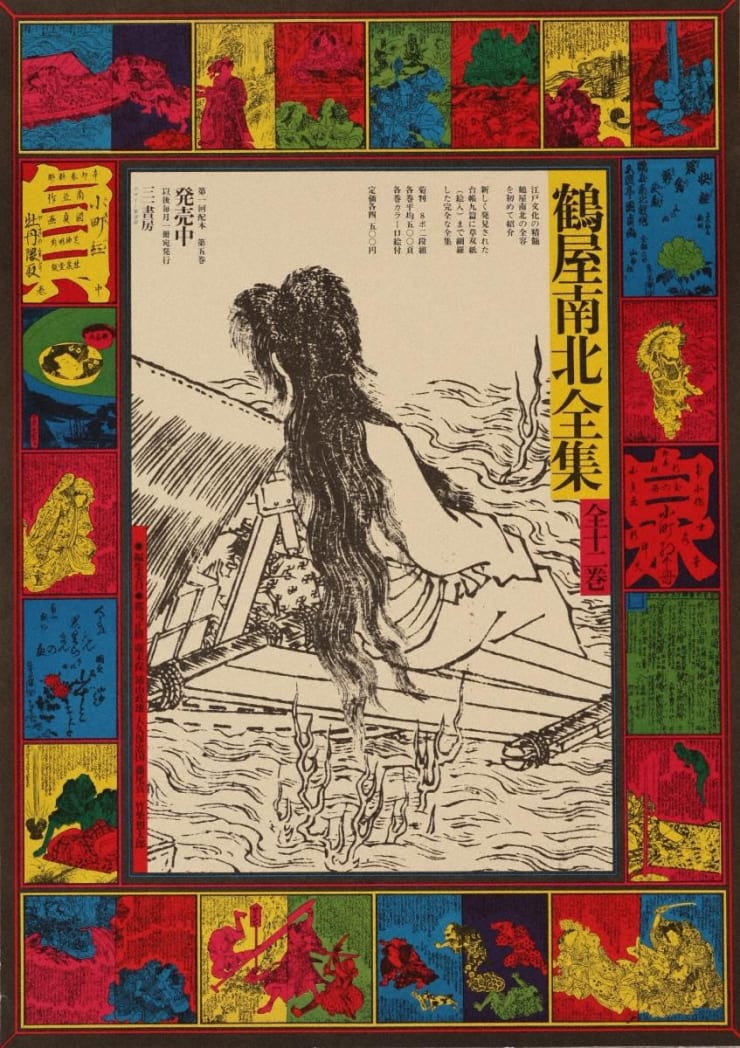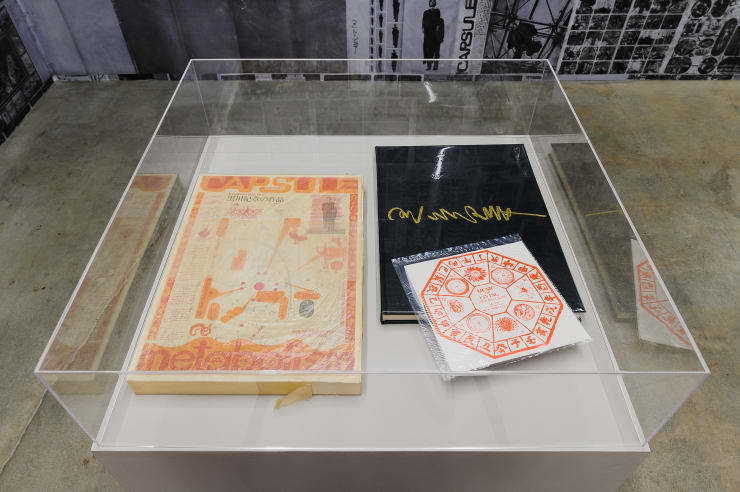Kiyoshi Awazu
Kiyoshi Awazu (粟津 潔, February 19, 1929 – April 28, 2009) was a pioneering Japanese graphic designer, artist, and cultural innovator whose eclectic and vibrant work reshaped post-World War II Japanese aesthetics. Born in Himonya, Meguro ward, Tokyo, Awazu was a self-taught artist whose creative output spanned graphic design, poster art, architecture, set design, filmmaking, and illustration. His distinctive style blended traditional Japanese art forms—such as ukiyo-e prints, calligraphy, and mingei (folk art)—with modern influences from pop culture, surrealism, and the Bauhaus movement, creating a visually striking and socially engaged body of work.
Awazu’s early life was marked by hardship. His father, an electrical lab technician, died in a train accident when Awazu was an infant. At age four, his mother remarried, and he was raised by his grandmother and uncle. After elementary school, Awazu attended night trade school while working various jobs, including at a print press factory and a used bookstore in Kanda, where he immersed himself in poetry, literature, and prewar art journals. These experiences shaped his autodidactic approach and his belief that design was a fundamental human function, capable of bridging rural traditions with urban modernity.
Awazu’s career gained momentum in 1954 when he joined the advertising department of Nikkatsu film studios, designing posters for Kabuki theater and films. His breakthrough came in 1955 with the poster Umi o Kaese (Give Back Our Sea), which expressed solidarity with fishermen displaced by the American Occupation. The poster’s bold, symbolic imagery and political activism earned him the Japan Advertising Artists Club Award and established him as a leading voice in graphic design. Over the decades, Awazu’s work rejected the minimalist tendencies of Western modernism, instead embracing vibrant colors, expressive typography, and psychedelic symbolism to evoke Japan’s cultural heritage and advocate for social issues.
A key collaborator in the Metabolism architecture movement, Awazu worked with architects like Minoru Takeyama on projects such as the Nibankan building (1970) in Tokyo’s Kabukicho district, where his iconic supergraphics transformed the structure into a landmark of postmodern design. His interdisciplinary approach extended to art direction for films like Demon Pond (1979) and Double Suicide (1969), as well as experimental exhibitions like Expose 1968 at the Sogetsu Art Center. Awazu’s commitment to civic engagement and his resistance to soulless modernization made him a cultural icon, with his works celebrated globally in institutions like the Museum of Modern Art (MoMA) and the 21st Century Museum of Contemporary Art, Kanazawa.
Awazu continued to innovate until his death from pneumonia in 2009 at age 80 in Kawasaki, Kanagawa. His legacy endures through extensive collections of his work and exhibitions that highlight his role in revolutionizing Japanese graphic design.
-
 Kiyoshi AwazuTHE 2ND WORLD RELIGIONISTS CONFERENCE FOR PEACE (1999 Reproduction by Toppan Printing, LTD.), 1999 (1964)Offset PrintingB1; 40-9/16 x 28-11/16 inch
Kiyoshi AwazuTHE 2ND WORLD RELIGIONISTS CONFERENCE FOR PEACE (1999 Reproduction by Toppan Printing, LTD.), 1999 (1964)Offset PrintingB1; 40-9/16 x 28-11/16 inch
103.0 x 72.8cm
-
 Kiyoshi AwazuIchijiki Wo Sasaeru Undou, Risshokouseikai (一食を支える運動・立正佼成会), 1979Offset PrintingB2; 28-11/16 x 20-5/16 inches
Kiyoshi AwazuIchijiki Wo Sasaeru Undou, Risshokouseikai (一食を支える運動・立正佼成会), 1979Offset PrintingB2; 28-11/16 x 20-5/16 inches
72.8 x 51.5cm
-
 Kiyoshi AwazuKIGAKAIKYO, Starving Strait/BUNGAKUZA, 飢餓海峡 / 文学座 - Please note: This print ships from Japan, 1977Offset PrintingB2; 28-11/16 x 20-5/16 inch
Kiyoshi AwazuKIGAKAIKYO, Starving Strait/BUNGAKUZA, 飢餓海峡 / 文学座 - Please note: This print ships from Japan, 1977Offset PrintingB2; 28-11/16 x 20-5/16 inch
72.8 x 51.5cm
-
 Kiyoshi AwazuONNA TACHI KUMEHACHI ICHIZA NO HITOBITO/BUNGAKUZA, 1977Offset PrintingB2; 28-11/16 x 20-5/16 inches
Kiyoshi AwazuONNA TACHI KUMEHACHI ICHIZA NO HITOBITO/BUNGAKUZA, 1977Offset PrintingB2; 28-11/16 x 20-5/16 inches
72.8 x 51.5cm
-
 Kiyoshi AwazuKAIKA SOSHI DENSIN OTAMA / BUNGAKUZA, 開化草紙電信お玉/東横劇場/文学座, 1976Offset PrintingB2; 28-11/16 x 20-5/16 inch
Kiyoshi AwazuKAIKA SOSHI DENSIN OTAMA / BUNGAKUZA, 開化草紙電信お玉/東横劇場/文学座, 1976Offset PrintingB2; 28-11/16 x 20-5/16 inch
72.8 x 51.5cm
-
 Kiyoshi AwazuDOYO/NICHIYO/GETSUYO, Saturday, Sunday, Monday,/BUNGAKUZA, 1976Offset Printing. B2 size.28-11/16 x 20-5/16 inch
Kiyoshi AwazuDOYO/NICHIYO/GETSUYO, Saturday, Sunday, Monday,/BUNGAKUZA, 1976Offset Printing. B2 size.28-11/16 x 20-5/16 inch
72.8 x 51.5 cm
-
 Kiyoshi AwazuThe 6th Exhibition of Contemporary Japanese Sculpture, Public Offering, Ube City, Japan Museum Planning Council, THE MAINICHI NEWSPAPERS Aenean lacinia, 第 6 回現代日本彫刻展/公募 宇部市・日本美術館企画協議会・毎日新聞社, 1975Offset PrintingB2; 28-11/16 x 20-5/16 inch
Kiyoshi AwazuThe 6th Exhibition of Contemporary Japanese Sculpture, Public Offering, Ube City, Japan Museum Planning Council, THE MAINICHI NEWSPAPERS Aenean lacinia, 第 6 回現代日本彫刻展/公募 宇部市・日本美術館企画協議会・毎日新聞社, 1975Offset PrintingB2; 28-11/16 x 20-5/16 inch
72.8 x 51.5cm
-
 Kiyoshi AwazuHOZUKI, Chinese Lantern / BUNGAKUZA, 鬼灯/渋谷東横劇場/文学座, 1975Offset PrintingB2; 28-11/16 x 20-5/16 inch
Kiyoshi AwazuHOZUKI, Chinese Lantern / BUNGAKUZA, 鬼灯/渋谷東横劇場/文学座, 1975Offset PrintingB2; 28-11/16 x 20-5/16 inch
72.8 x 51.5cm
-
 Kiyoshi AwazuThe 5th Exhibition of Contemporary Japanese Sculpture / Ube City, Japan Museum Planning Council, THE MAINICHI NEWSPAPERS, 第5回現代彫刻展/宇部市野外彫刻美術館/ 宇部市・日本美術館企画協議会・毎日新聞社, 1973Offset PrintingB1; 40-9/16 x 28-11/16 inches
Kiyoshi AwazuThe 5th Exhibition of Contemporary Japanese Sculpture / Ube City, Japan Museum Planning Council, THE MAINICHI NEWSPAPERS, 第5回現代彫刻展/宇部市野外彫刻美術館/ 宇部市・日本美術館企画協議会・毎日新聞社, 1973Offset PrintingB1; 40-9/16 x 28-11/16 inches
103.0 x 72.8cm
-
 Kiyoshi AwazuOsai and Gonzo / BUNGAKUZA (B), おさい権三/国立劇場大劇場/文学座, 1973Offset Printing. B2 size.28-11/16 x 20-5/16 inch
Kiyoshi AwazuOsai and Gonzo / BUNGAKUZA (B), おさい権三/国立劇場大劇場/文学座, 1973Offset Printing. B2 size.28-11/16 x 20-5/16 inch
72.8 x 51.5 cm
-
 Kiyoshi AwazuOsai and Gonzo / BUNGAKUZA (A), おさい権三/渋谷東横劇場/文学座, 1973Offset PrintingB2; 28-11/16 x 20-5/16 inch
Kiyoshi AwazuOsai and Gonzo / BUNGAKUZA (A), おさい権三/渋谷東横劇場/文学座, 1973Offset PrintingB2; 28-11/16 x 20-5/16 inch
72.8 x 51.5cm
-
 Kiyoshi AwazuSEI GUREGORI NO JUNKYO, Martyrdom of St. Gregory/BUNGAKUZA, 1971Offset PrintingB2; 28-11/16 x 20-5/16 inch
Kiyoshi AwazuSEI GUREGORI NO JUNKYO, Martyrdom of St. Gregory/BUNGAKUZA, 1971Offset PrintingB2; 28-11/16 x 20-5/16 inch
72.8 x 51.5cm
-
 Kiyoshi Awazu“Tsuruya Nanboku Zensyu” / San-ichi Publishing Co., Ltd., 鶴屋南北全集/三一書房, 1971Offset PrintingB2; 28-11/16 x 20-5/16 inch
Kiyoshi Awazu“Tsuruya Nanboku Zensyu” / San-ichi Publishing Co., Ltd., 鶴屋南北全集/三一書房, 1971Offset PrintingB2; 28-11/16 x 20-5/16 inch
72.8 x 51.5cm
-
 Kiyoshi Awazu“Abe Sada, Sekine Hiroshi Shishu”/Doyo Bijutsusya Shuppan Hanbai, 1971Offset PrintingB2; 28-11/16 x 20-5/16 inch
Kiyoshi Awazu“Abe Sada, Sekine Hiroshi Shishu”/Doyo Bijutsusya Shuppan Hanbai, 1971Offset PrintingB2; 28-11/16 x 20-5/16 inch
72.8 x 51.5cm
-
 Kiyoshi AwazuUTSUKUSHIKI MONO NO DENSETSU / BUNGAKUZA, 美しきものの伝説/朝日生命ホール/文学座, 1971Offset PrintingB2; 28-11/16 x 20-5/16 inch
Kiyoshi AwazuUTSUKUSHIKI MONO NO DENSETSU / BUNGAKUZA, 美しきものの伝説/朝日生命ホール/文学座, 1971Offset PrintingB2; 28-11/16 x 20-5/16 inch
72.8 x 51.5cm
-
 Kiyoshi AwazuNIGORIE (B), Muddy Water/BUNGAKUZA, 1971Offset PrintingB2; 28-11/16 x 20-5/16 inch
Kiyoshi AwazuNIGORIE (B), Muddy Water/BUNGAKUZA, 1971Offset PrintingB2; 28-11/16 x 20-5/16 inch
72.8 x 51.5cm
-
 Kiyoshi AwazuHANAOKA SEISHU NO TSUMA, The Doctor’s Wife / BUNGAKUZA (A), 華岡青州の妻/国立劇場大劇場/文学座, 1970Offset PrintingB2; 28-11/16 x 20-5/16 inch
Kiyoshi AwazuHANAOKA SEISHU NO TSUMA, The Doctor’s Wife / BUNGAKUZA (A), 華岡青州の妻/国立劇場大劇場/文学座, 1970Offset PrintingB2; 28-11/16 x 20-5/16 inch
72.8 x 51.5cm
-
 Kiyoshi Awazu“Design Zue” / AWAZU Kiyoshi / TABATASHOTEN Publishing House Co., Ltd., デザイン図絵/粟津潔/田畑書店, 1970Offset Printing23-7/16 x 33-1/8 inch
Kiyoshi Awazu“Design Zue” / AWAZU Kiyoshi / TABATASHOTEN Publishing House Co., Ltd., デザイン図絵/粟津潔/田畑書店, 1970Offset Printing23-7/16 x 33-1/8 inch
59.4 x 84.1cm
-
 Kiyoshi AwazuCHI NO MURE / BUNGAKUZA, 地の群れ/紀伊国屋ホール/文学座, 1970Offset Printing. B228-11/16 x 20-5/16 inch
Kiyoshi AwazuCHI NO MURE / BUNGAKUZA, 地の群れ/紀伊国屋ホール/文学座, 1970Offset Printing. B228-11/16 x 20-5/16 inch
72.8 x 51.5 cm
-
 Kiyoshi AwazuThe Work of Kisho Kurokawa, 1970Hardcover 94 page book in slipcase and double-sided poster, designed by Kiyoshi Awazu. 7 inch 45 rpm vinyl record, audio-work by Toshi Ichiyanagi. Photography by Tomio Ohashi and others.14-7/8 x 10-1/2 x 1-1/4 inches
Kiyoshi AwazuThe Work of Kisho Kurokawa, 1970Hardcover 94 page book in slipcase and double-sided poster, designed by Kiyoshi Awazu. 7 inch 45 rpm vinyl record, audio-work by Toshi Ichiyanagi. Photography by Tomio Ohashi and others.14-7/8 x 10-1/2 x 1-1/4 inches
37.8 x 26.7 x 3.2 cm
-
 Kiyoshi Awazu富島松五郎傳 / TOMISHIMA MATSUGORO DEN, The Life of Muhomatsu/BUNGAKUZA, 1969Offset PrintingB2; 28-11/16 x 20-5/16 inch
Kiyoshi Awazu富島松五郎傳 / TOMISHIMA MATSUGORO DEN, The Life of Muhomatsu/BUNGAKUZA, 1969Offset PrintingB2; 28-11/16 x 20-5/16 inch
72.8 x 51.5cm

